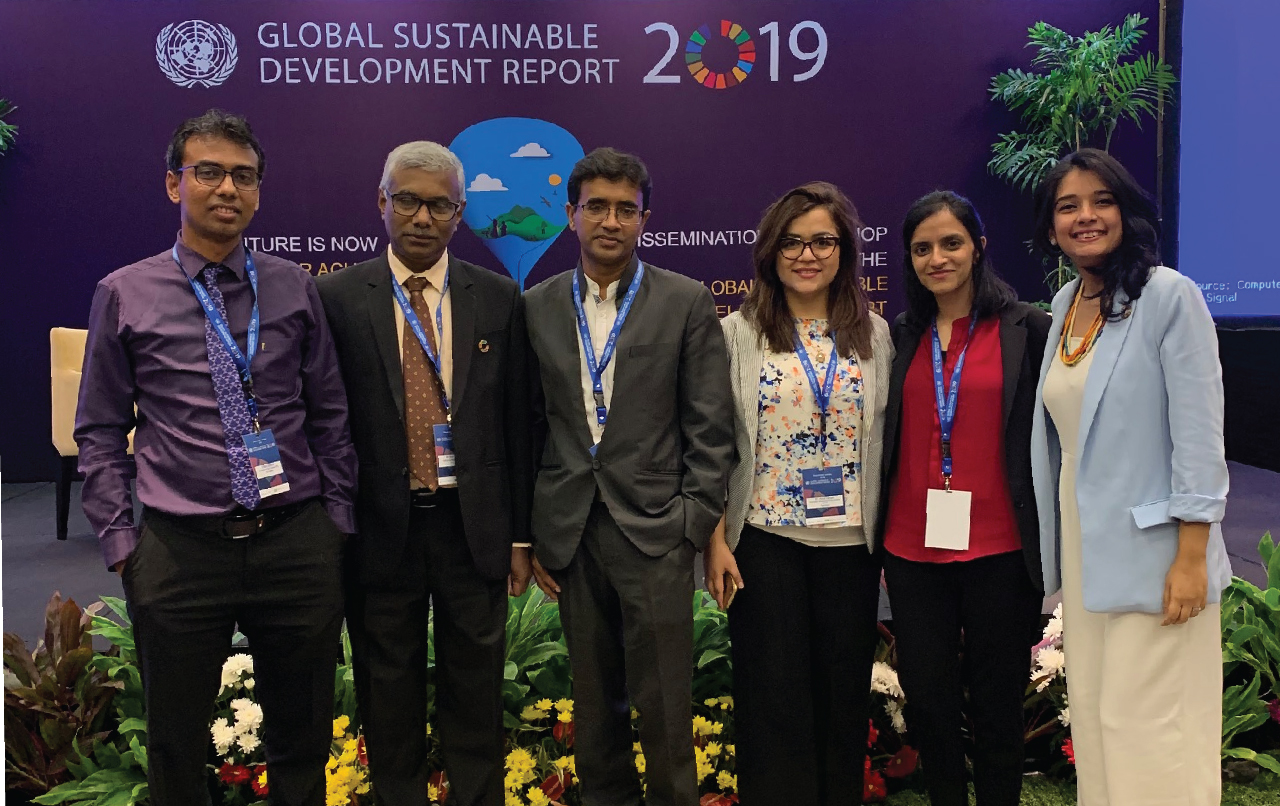Seven Southern Voice members from different Asian countries joined a three-day workshop in Jakarta with the theme: “GSDR 2019: Implications for Accelerating Sustainable Development in Asia-Pacific” (19-21 November 2019). The seminar was co-organized by the Ministry of National Development Planning of Indonesia (BAPPENAS); the Gesellschaft für Internationale Zusammenarbeit (GIZ), and UN-DESA in Jakarta. At the event, our members had the opportunity to talk about SDG implementation in their respective countries. Two of them share a brief report about their experience here:
Echoing the main findings of the Global Sustainable Development Report (GSDR) 2019, representatives from government, science, academia and civil society organizations put a focus on a ‘circular economic model’. They argued that this was better than the current ‘linear’ approach for realizing the 2030 Agenda for Sustainable Development in the Asia-Pacific region. Four levers will play an important role: governance, finance, science and technology, and individual and collective action. While the role of science is vital, coordinated action by all stakeholders, including governments, business, communities, civil society and individuals, is needed for this transformation to happen. Participants discussed what is needed to strengthen these levers in their national context and how they can be deployed to make progress through the identified entry points.
To accelerate achieving SDG targets in the Asia-Pacific region, participants discussed three entry points: Food and Nutrition, Energy Decarbonization and Access, and the Environmental Commons. They discussed national experience- successes as well as ongoing challenges. They also looked at cross-cutting and integrated approaches to policymaking, partnership mobilization and SDG implementation through the aforementioned entry points, in ways that have positive impact goals and targets. Different stakeholders discussed the importance of existing tools and good practices, as well as the role of innovation in science and technology. (by Shanawez Hossain, PhD)
Day 1
The GSDR 2019 Report was launched on the first day of the workshop. It is the successful endeavour of 15 independent scientists. Key points were discussed, among them the UN Sustainable Development Framework INDONESIA (2021-2025). It has four components: a) Inclusive human development, b) economic transformation, c) climate change and disaster resilience and, d) innovation for SDG acceleration.
Participants were divided into three working groups: food & nutrition, energy & decarbonisation and environmental conditions. I was part of the food & nutrition group.
Day 2
On the second day, we discussed country-specific examples of challenges in food security. All challenges were examined under the lens of implementation levellers, such as governance, individual and collective action, economy & finance, and science & technology.
We learned about country-specific problems. For example, in northern India, Basmati rice cultivators of Punjab and Haryana were asked by the government to start paddy cultivation with the onset of monsoon, as this variety of rice exploits groundwater. Due to a delay of the monsoon, the paddy cycle was late and farmers hardly got time to manage weeds and straws generated from the field. They decided to burn it and that created a haze over Delhi’s sky in the month of November and December. Various suggestions were given by the participants about weeds and straw management. Straws can be made into beautiful paper or can be used as cattle feed. However, the labour problem was not discussed in the session. Fuel subsidy for transporting those straws to the south and the east should be considered as well, said the participants. However, it was overlooked that Punjab and Haryana agriculture depends on migrant labourers from the east. They were not available due to the festive season of the Chatt festival.
A participant from Mongolia discussed the problem as well, with her country as an example. Mongolia is known for having a harsh climate and pastoral nomad tribes. The main diet is meat-based, as vegetables are expensive. Recently, traditional herders started breeding commercial animals, like cashmere goats. These eat grasses from the roots, leaving little food for other animals. Chinese and American meat industries are coming to Mongolia. They are purchasing red meat-producing animals from the herders, but earlier they yielded lean meat. Change in meat-type consumption is leading to obesity and health problems. At the same time, cashmere goat cultivation is creating depletion of soil nutrients and grass varieties.
Another participant from Fiji talked about the marine resource depletion problem. Fiji is a small island and has limited lands for agriculture. Development of fisheries could be a way of tackling obesity and red meat-related health problems. Apart from hunger, obesity is a silent killer.
Day 3
On the last day, we changed groups and tried to give inputs on all other issues. The workshop ended with a nice presentation from the ARUNA INDONESIA foundation. It works on fishermen’s development. Their representative showed a video of the fishermen’s life and problems in Indonesia and how this organization is trying to solve the issues of over-catching and baby fish catching.
The main problem identified in the food and nutrition group is that getting food is not the only problem. The issue of nutritious food, healthy food and alternatives to junk food are the real problem. A shift in lifestyle and food habits is necessary to stop the obesity problem, but most governments are overlooking this. (by Dr Mala Mukherjee)


